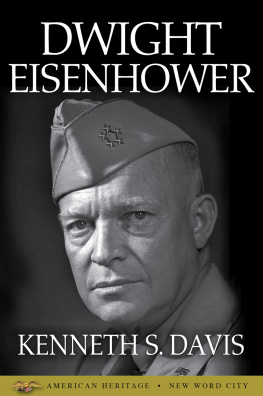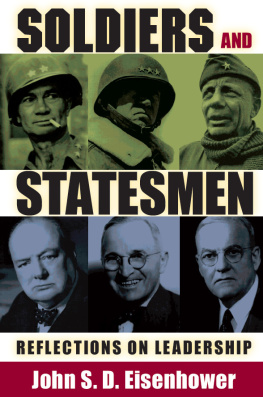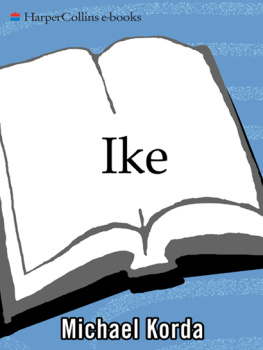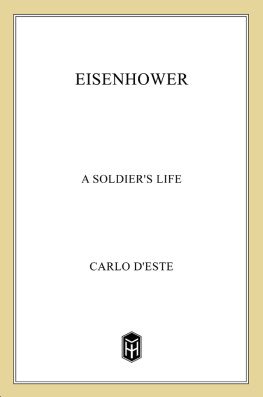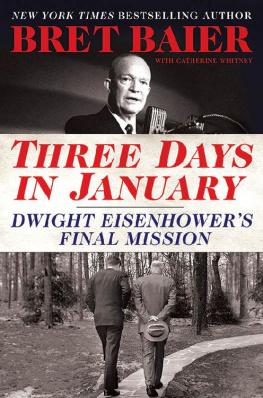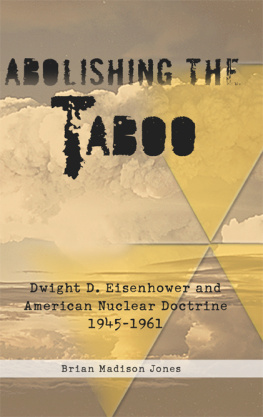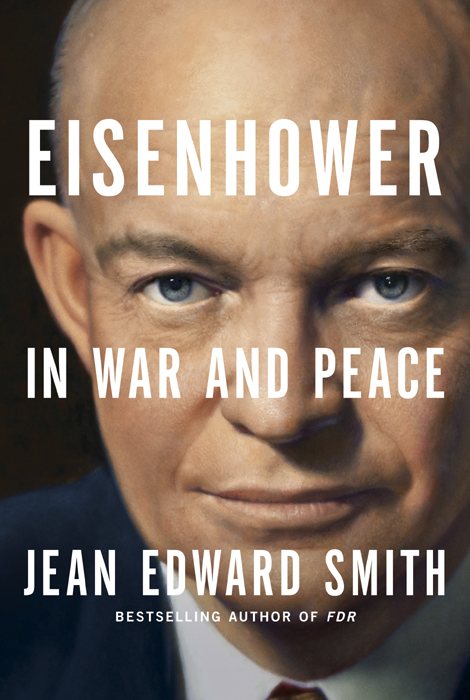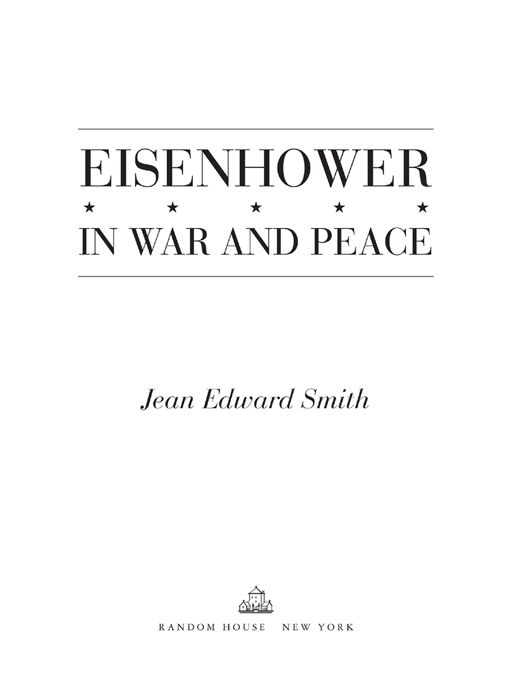A LSO BY J EAN E DWARD S MITH
FDR
Grant
John Marshall: Definer of a Nation
George Bushs War
Lucius D. Clay: An American Life
The Conduct of American Foreign Policy Debated
(ed., with Herbert M. Levine)
The Constitution and American Foreign Policy
Civil Liberties and Civil Rights Debated
(ed., with Herbert M. Levine)
The Papers of General Lucius D. Clay (ed.)
Germany Beyond the Wall
Der Weg ins Dilemma
The Defense of Berlin
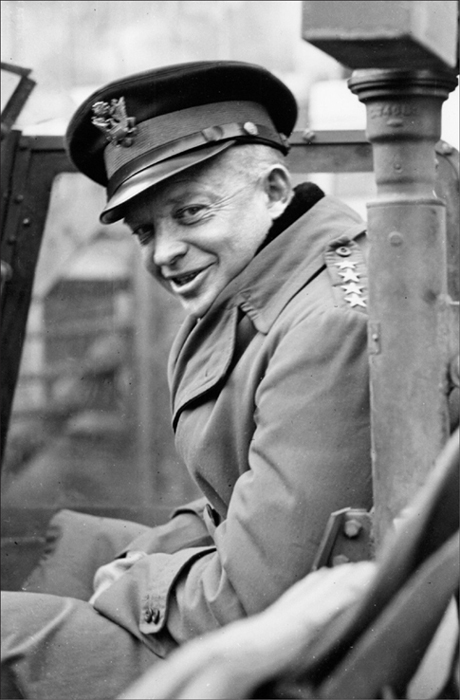
Copyright 2012 by Jean Edward Smith
Maps copyright 2012 by Mapping Specialists
All rights reserved.
Published in the United States by Random House,
an imprint of The Random House Publishing Group,
a division of Random House, Inc., New York.
R ANDOM H OUSE and colophon are registered
trademarks of Random House, Inc.
LIBRARY OF CONGRESS CATALOGING-IN-PUBLICATION DATA
Smith, Jean Edward.
Eisenhower in war and peace / by Jean Edward Smith.
p. cm.
Includes bibliographical references.
eISBN: 978-0-679-64429-3
1. Eisenhower, Dwight D. (Dwight David), 18901969. 2. PresidentsUnited StatesBiography 3. GeneralsUnited StatesBiography. 4. United StatesPolitics and government19531961. 5. United States. ArmyBiography. I. Title.
E836.S56 2012 973.921092dc22 2011008605
[B]
www.atrandom.com
Jacket design: Base Art Co.
Jacket painting: Michael J. Deas
v3.1
For Christine
I hate war as only a
soldier who has lived it can.
DWIGHT D. EISENHOWER
Preface
Dwight Eisenhower remains an enigma. For the majority of Americans he is a benign fatherly figure looming indistinctly out of the mists of the pasta high-ranking general who directed the Allied armies to victory in Europe, and a caretaker president who presided over eight years of international calm and domestic tranquility. To those who knew him, Ike was a tireless taskmaster who worked with incredible subtlety to move events in the direction he wished them to go. Most would agree he was a man of principle, decency, and common sense, whom the country could count on to do what was right. In both war and peace he gave the world confidence in American leadership.
Ikes generalship has often been disparaged. Some have suggested he lacked strategic vision, that he was a mere administrator, a hail-fellow-well-met who simply kept everyone content and in harness while working toward a common goal. It is easy to understand how such misconceptions could arise. Eisenhower made victory appear inevitable. He did not posture or pose for the press, he issued no grandiloquent communiqus, and he did not pit himself against high command or political authority. He got on with the job with a minimum of fuss. He was parsimonious with the lives of the troops entrusted to his command, evenhanded toward his allies, and ready to take responsibility for whatever occurred. He was a military leader in the time-honored tradition of Washington and Grant, a man who symbolized American democracy: the ideal commander for a citizen army of draftees.
Eisenhowers job was not easy. Topside were Churchill, Roosevelt, and de Gaulle, each with his own ideas about how the war should be fought. The chain of command ran through the Combined Chiefs of Staff, principally General George Marshall and Field Marshal Sir Alan Brooke, who were often at odds over what course to follow. Ike handled his command relationships with what appeared to be effortless aplomb. In fact, he did it so well that one rarely considered the complexities involved.
The task he faced was daunting. Eisenhower commanded the largest multinational force ever assembled, mounted an unprecedented cross-Channel invasion of Europe, mastered logistical problems on a scale never before encountered, and came to grips with a battle-tested German Army fighting on familiar terrain. Dealing with fractious but gifted subordinates such as George Patton and Bernard Montgomery seemed relatively simple by comparison.
Like Grant and Pershing, Eisenhower commanded on the spot. He did not dodge difficult decisions, he did not pass the buck to staff conferences or subordinate commanders, and he always knew that if he did not measure up, he would be summarily relieved. Supreme commanders do not enjoy job security. At any moment a necessity might arise for my relief and consequent demotion, Ike wrote his son John in 1943. When the war ended, Eisenhowers accomplishment in leading the Western powers to victory was fully recognized, yet today it has largely receded from our understanding.
Eisenhowers presidential years appear equally remote. Yet with the exception of Franklin Roosevelt, Dwight Eisenhower was the most successful president of the twentieth century. He ended a three-year, no-win war in Korea with honor and dignity; resisted calls for preventive war against the Soviet Union and China; deployed the Seventh Fleet to protect Formosa from invasion; faced down Khrushchev over Berlin; and restored stability in Lebanon when sectarian violence threatened to pull the country apart. On the home front, Ike punctured the Roosevelt coalition, weaned the Republican party from its isolationist past, restored the nations sanity after the McCarthyite binge of Communist witch-hunting, and proved unbeatable at the polls. During his two terms in the White House, his monthly approval rating averaged 64 percent, a figure never equaled since World War II.
Eisenhower believed that the United States should not go to war unless national survival was at stake. There is no alternative to peace, he famously said. He dismissed the necessity of conflict beneath the nuclear threshold and refused to engage American troops in brushfire wars for political abstractions. After Ike made peace in Korea, not a single American died in combat for the next eight years.
When the National Security CouncilDulles, Nixon, and the chairman of the Joint Chiefs of Staffrecommended intervention (including the use of nuclear weapons) at Dien Bien Phu to rescue the beleaguered French garrison, Eisenhower summarily rejected the proposal. You boys must be crazy, he told his national security assistant, Robert Cutler. We cant use those awful things against Asians for the second time in less than ten years. My God. Five years later, when China threatened force against Taiwan, the Joint Chiefs recommended an immediate nuclear response, and once again Eisenhower rejected the idea.
When Britain, France, and Israel invaded Egypt to seize the Suez Canal in 1956, Eisenhower forced them to withdraw, toppling Anthony Edens government in London, undercutting the Fourth Republic in France, and threatening financial sanctions against Israel. That repudiation of what Ike called old fashioned gunboat diplomacy not only kept the peace but enhanced American prestige throughout the world.
Domestically, Eisenhower tamed inflation, slashed defense spending, balanced the federal budget, and worked easily with a Democratic Congress. Two of his appointees to the Supreme Court, Chief Justice Earl Warren and William Brennan, launched a judicial revolution. Presidents cannot control the decisions of their appointees, and Ike was disappointed in some of the rulings of the Warren Court, but the advances Americans have experienced in civil liberty and social justice during the past fifty years are in some very large measure attributable to Warren and Brennan.



